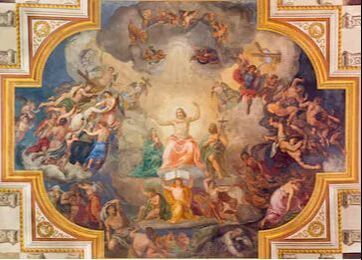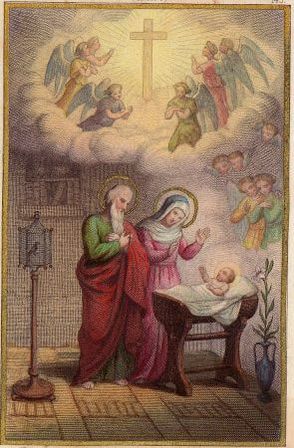
I. As fear is the beginning of wisdom, the Church upon this day opens her ecclesiastical year, by recalling to the minds of her children the terrors of the great accounting-day, upon which neither saint nor sinner can reflect without a thrill of shuddering horror. It is no wonder that they fill us with dread; for the very shadows which that day of wrath shall cast before it, will be enough to make the strong man wither away with fear, and expectation of what shall come upon the earth. The great globe beneath his feet shall rock to its very centre; the sun and the moon shall be darkened, and the stars shall not give their light; the sea shall pile up its tumultuous billows to rush in over the land; and the fires hidden in the bowels of the earth shall break forth to consume and to destroy. It is, of course, uncertain whether you will be living when these things shall come to pass. Yet, though it is uncertain whether you will live to see the signs which shall precede the coming of the Almighty Judge, of this one thing you may be perfectly certain that you, together with all the men who have ever breathed the breath of life, will be standing in the valley of judgment when the sign of the Son of man shall appear in the clouds of heaven.
Your eyes will look upon Jesus Christ, coming with great power and majesty to judge the living and the dead. You will stand there, surrounded by those who have sat by your side in the study and in the classroom. You will be seen by the professors who taught you, and whom you loved so well. Your parents, your brothers, your sisters, your relatives, will all be there with you. You will be there, not as an indifferent spectator, but as a prisoner at the bar, to answer to Almighty God for all the deeds done in the body, whether they have been good or evil.
II. You may perhaps ask the reason why God, Who at the moment of death has already decided the eternal doom of each of us, shall once again cite the human race collectively before His dread tribunal. Many and grave reasons are given by theologians; but let this one suffice, for it is sound, and calculated, moreover, to inspire us with salutary fear: God shall summon the whole human race to a general judgment, because each of us owes to his fellow-men a debt of truth.* His life ought to have been so blameless as to have enabled him to throw open the secret recesses of his soul to the gaze of all around him, and to bear their scrutiny without a blush. Has this debt of truth been paid by us to our brethren?
With sorrow we must confess that it has not. For nearly everyone bears about with him two personalities: one which is known to God and to himself, the other which is known to men. The man, as he stands before the eyes of God, is most studiously concealed from view, and little more than a mask is presented to the gaze of his neighbour. Hence it often happens that a scoundrel goes down to his grave with the reputation of an honest man; a libertine wears the garb of unspotted virtue; and pride the most detestable lies concealed beneath the cloak of humility. As a matter of fact, there is oftentimes as great a difference between the man as he really is, and the man as he appears to be, as there is between a smoothly-polished marble monument, and the rottenness and corruption which lie festering beneath it. God, therefore, has decreed that there shall be a great accounting-day, on which this debt of truth must be paid to humanity. He will then tear down the lying epitaph, and overturn the marble monument, and lay bare before the eyes of the whole world the rottenness and corruption of the soul.
The deeds which have been done in darkness shall be dragged forth into the light; the words which have been whispered in the ear shall be thundered forth by the Archangel's voice; the thoughts and the desires of the heart, springing into existence quick as the lightning-flash, multitudinous as the sands of the sea, shall all be made manifest and brought to judgment.
III. You are going this day to approach the Holy Altar, to partake of the victim which is there offered up for the sins of the world. You are going to receive into the tabernacle of your heart Him, before Whom you will one day stand in fear and trembling, to hear the sentence of your eternal doom. Therefore, look well into yourself, and see whether your soul is able to bear the searching glance of His all-seeing and all-holy eyes.
Is your life so pure that you could stand up fearlessly in the presence of your companions and professors, and let their eyes see you as you appear to the eyes of your God? Just examine into the nature of the thoughts which pass through your mind as you sit poring over your books. See
whether your words are so blameless that you would not fear to utter them before your masters. Are your desires always lawful? Are your actions always so innocent that they might be done in the light of day? If, after a careful scrutiny, you find that you have not harboured evil thoughts and desires, nor spoken wicked words, nor done anything that you would be ashamed of, you need not fear to approach the banquet in which Christ is received. For before God you are that which outwardly you appear to be before men, and therefore there is no debt of truth due from you unto them. But if you cannot do this if you are conscious to yourself of not being what you seem to be if you feel that you are like the whited sepulchre, fair without and foul within stand back! Go, first, and pay your debt of truth. Reveal yourself before man, and let him see you just as you are before God.
Our merciful Lord does not require you to do this before all men, but only before one who holds His place. Before him you must manifest yourself as you are. At his feet weep over your sins, and your kind, merciful God will blot them all out for you. Then you need fear nothing; for on the dreadful Judgment-day the sins of the just shall not be made a spectacle to Angels and to men, because, having been washed away by repentant tears, they are, before God, as if they had never been. Do not fail, while Jesus dwells within you, to ask for grace to lead so pure and holy a life, that you will never be ashamed to let the whole world look into the most secret recesses of your heart. If you can do this, the day of wrath will not have any terrors for you.
You will fear no evil, because you know no sin.
*Nicolas, Etudes Philosophiques, torn, iii., chap. xvi.
Source: Lectures for Boys, Volume I, Imprimatur 1896



 RSS Feed
RSS Feed